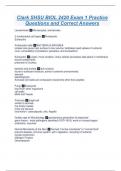Clark SHSU BIOL 2420 Exam 1 Practice
Questions and Correct Answers
Leuwenhoek ✅Microscopes, animalcules
2 fundamental cell types ✅Prokaryotic
Eukaryotic
Prokaryotic cells ✅BACTERIA & ARCHAEA
smaller size gives high surface to low volume, facilitates rapid uptake of nutrients
cons: vulnerability to predators, parasites, and competitors
Eukaryotic ✅Larger, more complex, many cellular processes take place in membrane
bound components
precense of nucleus
bacteria and archea ✅lack nucleus
found in sufficient moisture, some in extreme environments
asexual
peptidoglycan
Archaeal cell walls are composed of polymers other than peptido
Fungi ✅Eukaryotic
food from other organisms
cell walls
Mold and Yeasts
Protozoa ✅single cell
similar to animals
live freely inwater
most are asexual
locomotion - pseudopods, cilia, flagella
Golden age of Microbiology ✅spontaneous generation id disproved
germ theory - most pathogens identified (1875-1918), work on viruses began,
antibiotics, vaccines
Normal Microbiota of the Skin ✅Termed "normal microbiota" or "normal flora"
prevent disease, immune system, aid in digestion, recycling of nutrients
oxygen production
Nitrogen Fixation
Decomposers
, Commercial Benefits ✅Food production - bread and yeast
fermentation - beer
fermentation of milk - yogurt, cheese, buttermilk
Biodegredation ✅PCB's, DDT, TRICHLOROETHYLENE
Biotechnology ✅Use if microbial and biochemical techniques to solve practical
problems
Genetic Eengineering ✅Introduction of genes into another organism, disease resistant
plants, production of medication
microbes and disease ✅most microorganisms are not harmful, viral disease smallpox
once a leading killer (10M deaths over 4,000 years, eradicated, no reported cases since
1977)
Plague ✅1/3 population of Europe dies btwn 1346-50, today fewer than 100 die
worldwide, control rodent population, antibiotics available
In US how many infections ✅750M infections, 200,000 deaths, costs tens of billions of
dollars
Emerging Diseases ✅most newly recognized, swine flu, SARS, MR TB, Lyme, Hep C,
AIDS, E. coli, Ebola
Pathogens can become resistant to antimicrobial medications, increases travel and
immigration, many diseases eliminated, changes in population - weakened immune
system, chronic diseases may be caused by bacteria - crohn's, indigestion, peptic ulcers
Koch's Postulates ✅suspected causative agent must be found in every case of the
disease and be absent from healthy hosts, agent must be isolated and grown outside
the host, when agent is introduced into a healthy, susceptible host, the host get the
disease, same agent must be found in the diseased experimental host
Scientific Method ✅make observation
developed a testable explanation called a hypothesis
design experiment to test hypothesis
do experiment and collect and analyze data
draw a conclusion
communicate methods, results and conclusions
a scientific theory is an explanation supported by a large amount of evidence
Biochemistry ✅study of metabolism: chemical reactions that occur in living organisms




